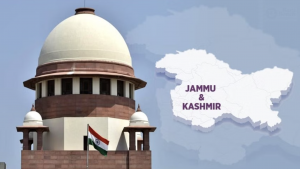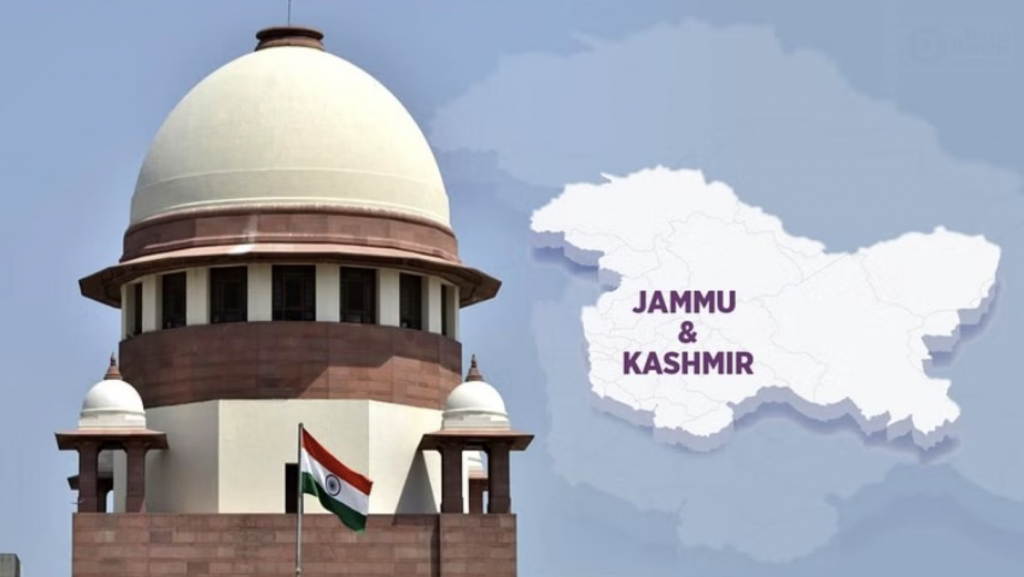NEW DELHI : National Conference leader Mohd Akbar Lone told the Supreme Court on Monday that those who support repealing Article 370 shouldn’t apply a “emotive majoritarian interpretation” of the Indian Constitution because Jammu and Kashmir wasn’t asked to sign a merger agreement like other princely states or have a complete connection to India. The senior attorney Kapil Sibal testified on behalf of Lone before a five-judge panel led by Chief Justice DY Chandrachud that India’s sovereignty has never been questioned.For the fifteenth day, the constitution bench was debating the arguments against the repeal of Article 370’s provisions. Lone and other petitioners who are contesting the Centre’s judgement, according to Sibal, have always argued that Jammu and Kashmir is a fundamental part of India. “We cannot turn this situation into a contentious, majoritarian interpretation of the law. History reveals that Jammu and Kashmir is not entirely associated with India. The former state had a distinct, in-depth Constitution as well as an organised executive and administrative system. A merger agreement was never requested from it, according to Sibal.When Article 370 specifies that “concurrence” of the state government with respect to particular topics is essential, he said to the bench, which also included Justices Sanjay Kishan Kaul, Sanjiv Khanna, BR Gavai, and Surya Kant, that the executive can also say “no.” In response, the CJI informed Sibal that the Indian Constitution is silent on what will happen when the Constitution of Jammu and Kashmir is ratified. “As you can see, there is no explicit clause. What would happen after the J-K Constitution is put into effect is completely unknown. “As you can see, there is no explicit clause. What would happen after the J-K Constitution is put into effect is completely unknown. It was comparable to enabling Article 370 to function and letting the integration process (of J-K) come to an end. However, the Indian Constitution does not specify when integration will end, according to the CJI. Sibal argued once more that after the founding parliament of Jammu and Kashmir finished its term in 1957 and the state’s constitution was written, Article 370 took on a permanent character. “We should interpret the Constitution textually and contextually, but not by looking at what there is in silence,” he argued. According to Sibal, repealing Article 370 requires a “political solution” and is a political process. “So, you’re stating that the Constitution cannot be amended to repeal Article 370 and that a political solution must be sought. All solutions must be found within the constraints of the Constitution, CJI Chandrachud reminded Sibal. Sibal’s submissions are still up in the air and will go on till Tuesday. The top court heard arguments from intervenors’ attorneys earlier in the day as they defended the Centre’s decision to repeal Article 370, which granted the former state of Jammu and Kashmir special status, on August 5, 2019. Senior counsel V Giri, Additional Solicitor Generals KM Nataraj and Vikramjeet Banerjee, and others were among those who made their cases. Tuesday will be the final day for hearing submissions on Article 370, the bench made it clear. On September 1, the intervenors had informed the supreme court that the Indian Parliament had been taken into consideration when the decision to repeal Article 370 was reached. A Constitution bench received several petitions in 2019 that contested the repeal of Article 370 and the Jammu and Kashmir Reorganisation Act, which divided the former state into Jammu and Kashmir and Ladakh, two union territories.


